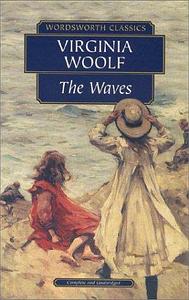Take a photo of a barcode or cover
‘Why look,’ said Neville, ‘at the clock ticking on the mantelpiece? Time passes, yes. And we grow old. But to sit with you, alone with you, here in London, in this firelit room, you there, I here, is all. The world ransacked to its uttermost ends, and all its heights stripped and gathered of their flowers, holds no more. Look at the firelight running up and down the gold thread in the curtain. The fruit it circles droops heavy. It falls on the toe of your boot, it gives your face a red rim – I think it is the firelight and not your face; I think those are books against the wall, and that a curtain, and that perhaps an arm-chair. But when you come everything changes. The cups and saucers changed when you came in this morning. There can be doubt, I thought, pushing aside the newspaper, that our mean lives, unsightly as they are, put on splendour and have meaning only under the eyes of love.
In: using Virginia Woolf 4 clout
Out: reading Virginia Woolf
Out: reading Virginia Woolf
challenging
mysterious
reflective
medium-paced
Plot or Character Driven:
Character
Wish I’d liked it more.
Han pasado varios días desde que lo terminé y aún no encuentro las palabras para describir esta novela.
Es fascinante. Rara como un perro verde, pero un ejercicio de estilo que si te atrapa, no te suelta. Posiblemente es un libro de extremos (o lo amas o lo odias, no creo que pueda dejar indiferente a nadie), pero tan alejado de lo corriente y tan lírico y tan devoto a su estilo (Woolf tiene muy claro en su cabeza cómo quiere escribir esta historia y lo hace hasta sus últimas consecuencias), que no puedo sino admirarlo.
Y sí, es triste y melancólico, ¡pero tan bonito y poético!
Es fascinante. Rara como un perro verde, pero un ejercicio de estilo que si te atrapa, no te suelta. Posiblemente es un libro de extremos (o lo amas o lo odias, no creo que pueda dejar indiferente a nadie), pero tan alejado de lo corriente y tan lírico y tan devoto a su estilo (Woolf tiene muy claro en su cabeza cómo quiere escribir esta historia y lo hace hasta sus últimas consecuencias), que no puedo sino admirarlo.
Y sí, es triste y melancólico, ¡pero tan bonito y poético!
reflective
slow-paced
Plot or Character Driven:
Character
Strong character development:
Yes
Loveable characters:
Yes
Diverse cast of characters:
No
Flaws of characters a main focus:
No
I just will never get over the necessity of me discovering Woolf when I did, of reading this when I did. There are so many ways in which one can effectively critique Woolf’s construction and self-perception of writing, art, and literature—a deeply bourgeoise turn toward the intensely individual, a fixation on the interiorities of the affluent marked by an unraveling or dismissal of the material plane of the world. The way in which war washes over the abstract interlude of To the Lighthouse, for example, never really puncturing the idyllic surface of the text, or the fate of Septimus becomes reread and rewritten through the eyes of Mrs Dalloway. Pain and pleasure for Woolf both seem to be affects that move an individual into the extreme margins of subjective experience where one becomes untethered from the material into the manic and the sublime.
But in The Waves Woolf seems to just give up on this arbitrary sense of separation between the mundane / ordinary and this elevated other plane where art and writing reside. The Waves resolutely inhabits a textual world that is both real but also completely just ridden with the madness and desire and pain and joy of its characters who are probably just all Woolf anyway; the difference between the singular and collective melt away as the stability of Woolf’s individual narrator crumbles and all you’re left with are just these pieces washed up on the shore by waves and waves and waves, just holding onto the things that the ocean heaves up before it takes it back again, and there’s something so beautiful about that sense of surrender, that choice to insist on this brokenness that is also whole, that I will just always respond so so deeply to
But in The Waves Woolf seems to just give up on this arbitrary sense of separation between the mundane / ordinary and this elevated other plane where art and writing reside. The Waves resolutely inhabits a textual world that is both real but also completely just ridden with the madness and desire and pain and joy of its characters who are probably just all Woolf anyway; the difference between the singular and collective melt away as the stability of Woolf’s individual narrator crumbles and all you’re left with are just these pieces washed up on the shore by waves and waves and waves, just holding onto the things that the ocean heaves up before it takes it back again, and there’s something so beautiful about that sense of surrender, that choice to insist on this brokenness that is also whole, that I will just always respond so so deeply to
✦ picture the prettiest artwork you've ever seen but make it prose
✦ an otherworldly experience in all its tides
✦ lowkey changed my life
✦ an otherworldly experience in all its tides
✦ lowkey changed my life
This might be a five-star book, but I need to let it settle first and see.
It's a very strange book––not really a novel in the way we usually think of the term. It narrates the subconscious of its characters, and in doing so raises all the questions of who, or what, we are as individual beings: what makes one oneself, what can we share with others, what keeps us separate from them.
It's a very strange book––not really a novel in the way we usually think of the term. It narrates the subconscious of its characters, and in doing so raises all the questions of who, or what, we are as individual beings: what makes one oneself, what can we share with others, what keeps us separate from them.
This masterpiece goes straight to my favorites. I'm always in awe of how beautiful Virginia Woolf can write, but this time, with this book, she really outdid herself.
challenging
emotional
reflective



